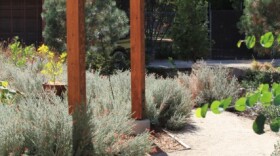Our gardening practices directly affect our community and our environment. There are many healthy gardening habits we can adopt that will lessen our personal impact on our surroundings, and in the process create a healthier environment.
There are basically eight areas of garden sustainability:
- Protecting water quality and quantity
- using climate-appropriate plants
- building healthy soils
- adopting less-toxic pest management
- reducing waste and recycling
- conserving energy
- creating habitat for beneficial wildlife, and
- growing food for your family and your neighborhood
Within each of these concepts, there are a myriad of things you can do to make your garden more sustainable.
Start with small steps in your garden. Many of these ideas are simple and free — and even one change makes a difference.
So starting with the first concept, protecting water quality and quantity: one important thing to do is to adjust your irrigation controller at least four times a year, if not monthly. Don’t hose off hard surfaces. Rather, sweep your grass clippings, leaves, soil, and fertilizer back into the landscape. Also, avoid water runoff. Keep rain and irrigation water on site by using swales, or dry creek beds, and use water-permeable hardscapes.
When you do plant this spring, try to choose low water plants appropriate for our climate and avoid being a “zone-buster." Also, select plants that will fit the available space at maturity.
The next area: use the least toxic methods possible to control pests. You could remove old fruit, hand-pick egg masses before they hatch or regularly hose off pests like aphids to keep them under control — and accept that perfection is not a requirement.
Building healthy soils and reducing waste are also important sustainable practices. One free thing that helps achieve both is composting all your organic matter on-site and then using that compost to amend or mulch your soil. Compost and mulch add nutrients, help to loosen heavy soils and retain moisture, improve drainage and protect the soil from compaction. Leaving the clippings on the lawn or grasscycling is also an easy sustainable practice.
Want to save energy? Consider planting deciduous shade trees on the south and west sides of your buildings to provide shade from the hot summer sun. Trees also contribute to cleaner air, reduced runoff, buffered noise pollution, and increased property value.
Another sustainable idea is to create habitat for beneficial wildlife by providing clean drinking water, creating critter shelters and providing natural sources of food from native or climate appropriate plants that have berries, seeds, pollen and nectar.
Finally, grow food for your family and your neighborhood. That's pretty easy to do even if you are only planting one tomato plant this spring.




